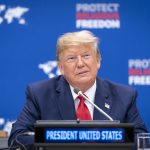The recent Joe Rogan podcast featuring the former president revealed a glaring opportunity that was missed. Instead of tackling the controversial topic of COVID-19 vaccines, which was hugely significant under his presidency, Rogan chose to play it safe and avoid pressing the ex-commander-in-chief on the praises heaped on the very shots that many Americans view with skepticism. It seems a discussion that could have cracked the façade of pharmaceutical bravado was swept under the proverbial rug.
Rogan, who has made a name for himself by diving into the great debates and exposing oddities of the medical establishment, surprisingly dodged a major inquiry during a moment that could have become a defining interview. The former president was a key player in Operation Warp Speed, and Rogan could have taken the opportunity to shine a light on why his guest continually applauded the very vaccines that were pushed through, a decision that seems more influenced by astroturfed information than genuine science. Instead, the podcast turned into another episode of ‘Let’s Talk About Anything But That.’
Lmao! Rogan couldn’t even see that shit lol pic.twitter.com/W977dzedBi
— Ny718 🇺🇸🇨🇴 (@Ny718allday) October 27, 2024
There’s an underlying narrative that emerges—Trump and many establishment politicians seem to have agreed upon a tacit, unwritten guideline: tread lightly around the vaccine discussion. The only reasonable conclusion to draw is that a cozy relationship exists between lawmakers and the pharmaceutical giants. It’s not surprising that the Democratic side of the aisle is in bed with Big Pharma; their cozy ties have been well-documented. Yet, the reluctance of many Republicans to join the fray is perplexing, save for a few brave souls like Rand Paul and Ron Johnson who dare to question the narrative.
A quick look at the numbers showcases the influence of money in politics. Reports reveal that political action committees linked to the pharmaceutical industry have poured well over $12 million into campaign contributions in the last couple of years, with a noticeable lean towards Democrats, but Republicans aren’t blameless either. Those in Washington remain eager to overlook the elephant in the room—the lucrative rewards that come from keeping certain conversations off the table.
As the political landscape shifts, the notion of taking a strong stance against the intertwining of government regulation and pharmaceutical profits seems all but lost for now. The golden opportunity for Trump to have clarified his position on the vaccines during the podcast has perhaps dissipated into thin air. For those wanting to see change, the time to address the biomedical overreach should have been during the primaries, not in the aftermath of their fading relevance.
As the race ramps up, voters are left weighing their options: a somewhat cautious former president against a Democrat who might as well take orders from Bill Gates. One choice might be preferred over the other, but it’s evident that neither option is a home run for the American people. The hope remains that figures like RFK Jr. and Calley Means, who embody a more stringent critique of the pharmaceutical industry’s grip on politics, can harness the right kind of energy to push for accountability and common sense in healthcare policy in the future.




